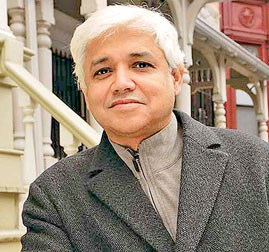Amitav Ghosh’s tangled paths of modernity
 Continued from last week Continued from last week
He rejects the notion that modernity needs to be understood as a
universal phenomenon where less developed countries seek to mimic the
paths trodden by more developed countries.
He rejects the evolutionary model of modernity and argues that
modernity needs to be understood in terms of specific historical
conjunctures, social formations and cultural imperatives. This idea, it
seems to me, underwrites many of his writings.
When we examine his novels such as the Circle of Reason, The Shadow
Lines, Calcutta Chromosome and The Glass Palace this fact becomes
evident. Modernity is a global phenomenon but it wears culture-specific
faces.
In his novels, and non-fiction writings, Amitav Ghosh has sought to
highlight the disjunctures and heterogeneities of modernity as they come
into contact with diverse breathing cultures.
|

Amitav Ghosh |
This of course demands a nuanced concept of culture which sees it as
a site in which meanings are made, unmade and re-made. Ghosh is keen to
dramatise the resourcefulness of men and women as they shape their
modernites as well their inadequacies in doing so. In Ghosh’s novel
modernity emerges as the meeting place of the global, national, regional
and asymmetric power relations.
He highlights these abstract thoughts through vividly realised
situations and complex interpersonal relations. Modernities are cultural
imaginaries that are constantly de-stabilised and re-shaped in
accordance with the ruling social forces. Ghosh’s characters bear
witness to this truth.
Cultural modernity
The idea of cultural modernity has been central to the efforts of
Sinhala novelists. From Piyadasa Sirisena onwards this has indeed been a
central theme that has stirred the imagination of Sinhala novelists and
short story writers.
For example, Martin Wickremasinghe in his trilogy (Gamperaliya,
Kaliyugaya and Yuganthaya) explores imaginatively what it means to be an
agent of cultural modernity. Similarly, Gunadasa Amarasekera has
highlighted this theme from his conceptual vantage point. Many other
Sinhala novelists have recognised the importance of this theme.
Modernity presupposes secularism, humanism, science, technology,
reason and progress. However, these get inflected through diverse
histories, geographies, cultures, traditions and religious
sensibilities.
Ghosh is especially sensitive to this interaction; he pays close
attention, in his fiction, to these spaces of interaction. What Amitav
Ghosh’s body of writing does is to urge us to re-think and re-imagine
this phenomenon from diverse perspectives and what it means to live in
this age of instant global communication.
Globalisation is a phenomenon with which Sri Lankan writers are
deeply concerned, and Amitav Ghosh has some important observations to
make in this regard.
His novels such as Circle of Reason, The Shadow Lines and The Glass
Palace and works of non-fiction such as In an Antique Land enable us to
perceive the complexities of globalisation and the most productive
vantage points from which to view it.
Globalisation is a phenomenon that is increasingly impacting the
lives of people throughout the world. In discussing globalisation, we
very often fall into an easy binary – globalism as a totalising force
that overcomes and obliterates localism.
However, Amitav Ghosh in novels such as The Shadow Lines and The
Hungry Tide points out that globalism and localism are co-implicated and
mutually constitutive.
What is interesting about the depiction of globalisation in Ghosh’s
novels is the way he transcends this easy binary and focuses on what I
term interactive sites and moments that manifest the complex give and
take occurring between the global and the local.
These interactive sites are marked by uncertainties, discrepant
desires, awkwardness, asymmetries of power, deceptions, manipulations,
and instabilities. Indeed it is at these sites of interaction that one
can perceive the full force of globalisation. If we take characters in
Ghosh’s novels such as Tridib (The Shadow Lines) and Piyali Roy (The
Hungry Tide ), we can understand the way characters operate in these
spaces of interactivity. Modern Sri Lankan writers, too, are
understandably interested in globalisation and its dark necessities of
history.
To be continued |


